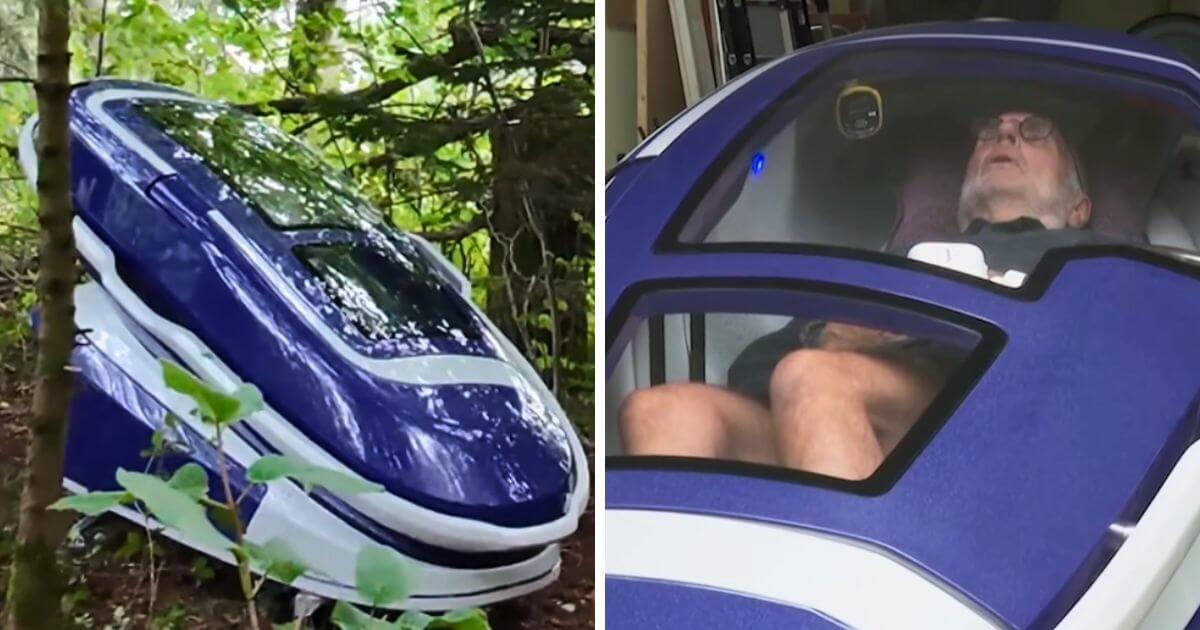An American woman has become the first to use the Sarco suicide machine in Switzerland despite the fact that its illegality was confirmed hours before her death, resulting in the arrest of four people.
According to reports, a 64-year-old American woman ended her life using the 3D-printed suicide machine in a forest near the German border in Merishausen, Switzerland on Monday 23 September.
On the same day, reportedly only hours before the unnamed American woman died, the head of the Federal Department of Home Affairs Elisabeth Baume-Schneider, when asked a question in the Swiss Parliament about the legality of the Sarco machine, confirmed that the use of the Sarco machine in Switzerland was prohibited.
Baume-Schneider said it “is not legal in two respects. Firstly, it does not meet the requirements of product safety law and may therefore not be placed on the market. Secondly, the corresponding use of nitrogen is not compatible with the purpose article of the Chemicals Act”.
Despite the ban, and a warning from Schaffhausen Public Prosecutor Peter Sticher, the assisted suicide went ahead.
According to the Times, four people were arrested in relation to the use of the Sarco machine including Florian Willet, the co-president of The Last Resort, an assisted suicide group which says it “is the only accompanied suicide service in Switzerland where the 3D-printed Sarco capsule will be used”. Two members of Willet’s legal team and a photographer were also arrested.
A statement from Schaffhausen Police suggests they have been charged with aiding and abetting a suicide, and police are also exploring whether other offences have been committed.
Each of those arrested were associates of Philip Nitschke, the inventor of the Sarco suicide machine.
The Sarco suicide machine
Nitschke, founder of the suicide advocacy group Exit International, originally introduced the device, which he calls the “Sarco machine”, in 2019. In an interview with SWI swissinfo.ch given in 2021, Nitschke said “It’s a 3-D printed capsule, activated from the inside by the person intending to die. The machine can be towed anywhere for the death”.
“The person will get into the capsule and lie down … They will be asked a number of questions and when they have answered, they may press the button inside the capsule activating the mechanism in their own time”.
Describing the actual manner of death, Nitschke said “The capsule is sitting on a piece of equipment that will flood the interior with nitrogen, rapidly reducing the oxygen level to 1 per cent from 21 per cent in about 30 seconds. The person will feel a little disoriented and may feel slightly euphoric before they lose consciousness. Death takes place through hypoxia and hypocapnia, oxygen and carbon dioxide deprivation, respectively”.
However, the use of the ‘Sarco machine’ has been dogged by controversy. Just two months ago, prosecutors in Switzerland banned its use because they were concerned not only about the legality of its use in the country but also potential ethical issues surrounding its implementation.
Public Prosecutor, Peter Sticher, has highlighted several critical concerns regarding the device’s legality and the mechanics of its operation. In a letter obtained by the Swiss media, Public Prosecutor, Peter Sticher said: “There is no reliable information about the method of killing. It is completely unclear who has control over which mechanical process during the dying process”.
The legal argument revolves around section 115 of the local penal code, addressing assisted suicide and potential charges for selfishly inducing or aiding it. Prosecutors argue that determining responsibility for euthanasia with the Sarco pod is impossible, prompting its ban. Sticher warned of “serious consequences” for Nitschke, emphasising the legal and ethical complexities surrounding the device.
Spokesperson for Right To Life UK, Catherine Robinson, said “Nitschke’s horrendous suicide machine should never have been used. Despite the Swiss government telling Nitschke loud and clear that the use of the suicide pod is illegal, his associates chose to ignore this and move forward with his agenda”.
“It is becoming increasingly clear how unrealistic the safeguards in place are for those who might attempt to use the device in future. This apparently fully automated process is a disaster in waiting. Instead of assisted suicide, we should focus on providing support and care for those in distress. Every life is precious and deserves protection”.












